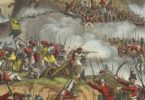Quiz on thoughts, ideas, theories, and philosophy of great Greek Philosophers Plato and Aristotle.
Plato lived during
(a) 5th and 4th century BC
(b) 4th and 3rd century BC
(c) 3rd and 2nd century BC
(d) 4th and 5th century AD
The Academy instituted by Aristotle was called
(a) The Academy
(b) Lyceum
(c) Ecclesia
Plato was a disciple of
(a) Aristotle
(b) Polybius
(c) Cicero
(d) Socrates
Which one of the following is Plato’s work?
(a) The Lyceum
(b) The Prince
(c) The Republic
Related: Roman number one to hundred
Following is a fundamental idea of Plato
(a) Theory of Education
(b) The Ideal Man
(c) Theory of Justice
(d) All the above
According to Aristotle, the State is
(a) Product of selfishness of man
(b) A convenience
(c) Organic
(d) Inorganic
According to the Philosophy of Plato, the fundamental character of Philosopher is
(a) Wisdom
(b) Courage
(c) Appetite
The basic character of Soldiers, according to Plato, is
(a) Wisdom
(b) Courage
(c) Appetite
In a Master-Slave relationship, according to Aristotle, the Slave is
(a) Not at all benefitted
(b) Benefitted
(c) Selling his work to his Master
According to Plato, the objective of the State is
(a) Good Life
(b) Good Administration
(c) Good Philosophy
(d) Good Economy
Related: Gandhi quiz questions and answers
The platonic system of education is
(a) Systematic and Progressive
(b) Systematic but not Progressive
(c) Progressive but not Systematic
(d) Neither Systematic nor Progressive
According to Aristotle, the three normal forms of Government are
(a) Kingship, Aristocracy and Polity
(b) Kingship, Aristocracy and Democracy
(c) Tyranny, Oligarchy and Democracy
According to Plato’s scheme of Education, Gymnastics is good for the
(a) Body
(b) Mind
(c) Spirit
According to Plato, the following classes should live in barracks
(a) Philosophers and slaves
(b) Masters and Slaves
(c) Philosophers and Soldiers
Plato’s ‘Republic’ contains his ideas about
(a) Justice
(b) Theory of State
(c) Theory of Education
(d) All the above
Related: Islamic questions and answers
According to Plato’s Communism
(a) Only the Upper Class can have Property
(b) Only the Lower Classes can have Property
(c) Both the Upper Class and Lower Class can have Property
(d) Neither the Upper Class nor the Lower class can have Property
According to Aristotle, which one of the following is the best form of Government?
(a) Kingship
(b) Aristocracy
(c) Polity
(d) Democracy
According to Plato, the Reason for not giving private Property to all classes is because
(a) Private Property is not good for people
(b) Private Property will lead to personal ambitions
(c) Economic and political power in the same hands is not for the State
(d) Both (b) and (c) above
According to Aristotle, Slavery is good for the Slave because
(a) He gets a constant supply of food
(b) The Master protects the Slave
(c) The Master does not kill the Slave
(d) He gets Virtue in a secondhand manner
Plato’s Philosopher King is
(a) A Philosopher who is like a King
(b) A King who is like a Philosopher
Related: mcq on Jainism
The most prominent characteristic of Plato’s State is
(a) There is a specialization of functions
(b) There is no specialization of functions
(c) There is decentralization of functions
(d) There is no decentralization of functions
In Plato’s State, the element of Reason is present in
(a) Philosophers
(b) Soldiers
(c) Workers
(d) Common Men
According to Aristotle, the function of the State is
(a) Good administration
(b) Economic Goodness
(c) Moral perfection of the individual
In Plato’s State, the element of Spirit is present in
(a) Philosophers
(b) Soldiers
(c) Workers
In Plato’s State, the element of Appetite is present in
(a) Philosophers
(b) Soldiers
(c) Workers
(d) Priests
Related: Syllogism questions with answers
According to the Platonic System of Education, education for the Philosopher King is
(a) Till the age of 35
(b) Till the age of 55
(c) Life-Long
According to Aristotle, Kingship might degenerate into
(a) Tyranny
(b) Oligarchy
(c) Democracy
Plato’s system of Communism is meant only for
(a) Philosophers and Soldiers
(b) Soldiers and Workers
(c) Philosophers, Soldiers and Workers
(d) Philosophers and Workers
According to Aristotle, the best method to prevent Revolution is to
(a) Develop the Spirit of obedience to law
(b) Observe small changes in the constitution
(c) Prevent concentration of too much power in too few hands
(d) All the above
According to Plato, Justice at the individual level means
(a) Selecting the true vocation in life
(b) Abiding by the Philosopher
(c) Having the right kind of education at the right age
(d) A service in the Military at the right time
Related: quiz on Entrepreneurship
According to Plato, Justice has
(a) Only Individual Dimension
(b) only Societal Dimension
(c) Both Individual and societal dimensions
According to Aristotle, he formed when a Family cannot meet all of Man’s needs.
(a) The Village
(b) The State
(c) The Commune
Plato instituted
(a) The Academy
(b) The University of Athens
(c) Lyceum
(d) Coliseum
Plato was
(a) A Political Thinker
(b) A Political Philosopher
(c) A Mathematician
(d) All the above
According to Aristotle, the following is the highest form of Community
(a) The Family
(b) The Village
(c) The Commune
(d) The State
According to Plato, the following are the three elements of man
(a) Reason, Spirit, Appetite
(b) Reason, Justice, Equality
(c) Justice, Liberty, Equality
(d) Reason, Spirit, Justice
Related: top 10 Religions in the World
According to Aristotle, the particular quality of a Master is
(a) Physical strength
(b) Intellectual Strength
(c) Both Physical strength and intellectual strength
In Plato’s State, the economic motive is satisfied by
(a) Philosophers
(b) Soldiers
(c) Workers
In Plato’s State, the Government is run by
(a) Philosophers
(b) Soldiers
(c) Workers
(d) Constitution
According to Aristotle, a Master can use the Slave
(a) To make money and power
(b) To protect himself
(c) For leisure
According to Plato
(a) The State is Justice, Liberty and Equality Writ Large
(b) The State is Society Writ Large
(c) The State is Philosopher Writ Large
(d) The State is Individual Writ Large
Plato advocated
(a) Equal Status for Men and Women
(b) Higher Status for Men
(c) Higher Status for Women
According to Aristotle, the Constitution
(a) Determines the arrangement of the offices of the State
(b) Determines who holds the offices
(c) Is not just the part of the State but the State itself
(d) All the above
Related: Greek Mythology questions
According to the Platonic system of education, Higher Education starts at the age of
(a) 18
(b) 20
(c) 25
(d) 35
According to Plato’s scheme of Education, Higher Education consists of the study of
(a) Music and Gymnastics
(b) Logic, Mathematics, Geometry, Astronomy
(c) Military and diplomatic Training
According to Aristotle, the cause of the Revolution is
(a) Man’s desire for equality and love for gain and honor
(b) Undue importance of some individuals in public life
(c) Carelessness in granting office and neglect of changes
(d) All the above
According to the Platonic scheme of education, Music is good for
(a) Body
(b) Soul
Related: World Modern History Quiz
The platonic concept of Justice at the societal level means a division of society into
(a) Philosophers, Soldiers and Workers
(b) Philosophers and Soldiers
(c) Rich and the poor
(d) Rulers and the ruled







Thank you for making a good content a perspective of mcq related exams & will be better. You can also make on Machiavelli,Hobbes,Locke,Rousseau,JS Mill,Karl Marx ,John Rawls.